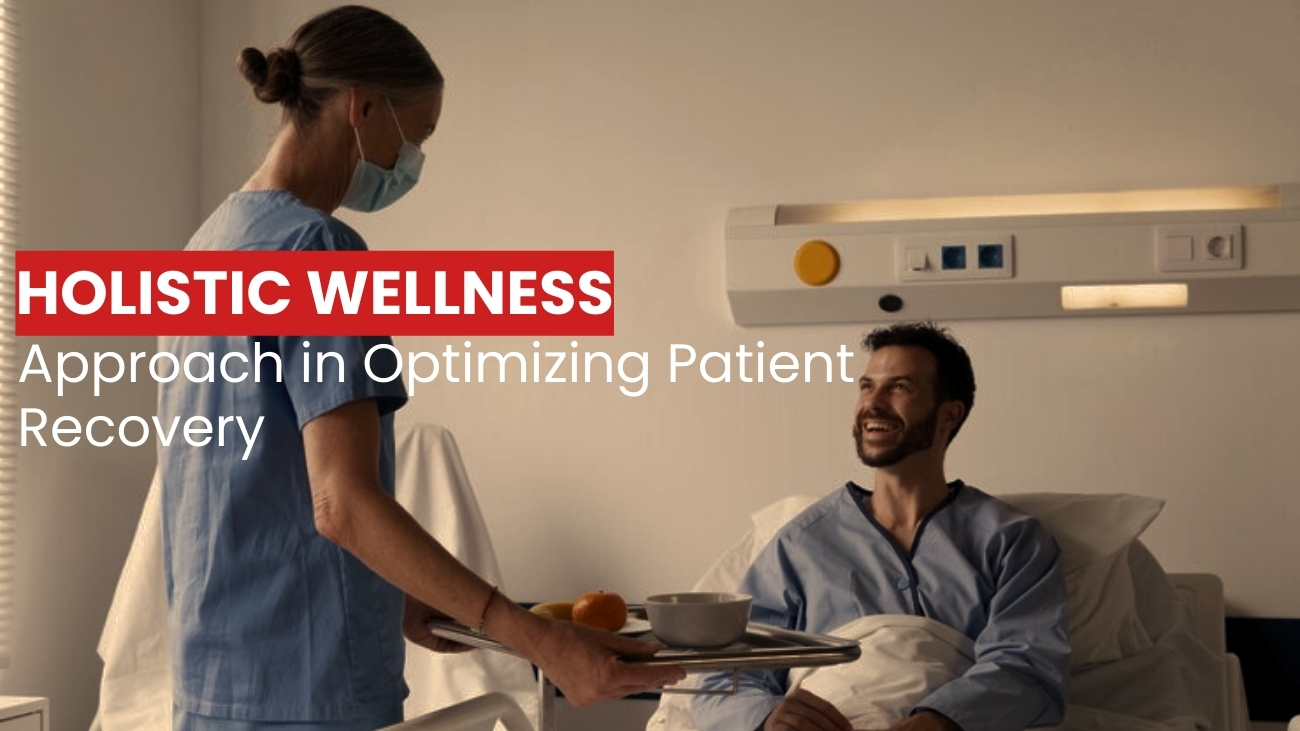In the field of healthcare, optimizing patient recoveries via a holistic wellness approach is becoming more popular. This approach takes into account the full person—body, mind, and spirit—to guarantee a thorough recovery. Healthcare professionals can give more effective and long-lasting results by concentrating on patients recovery.
Understand Holistic Wellness & Patient Recovery:
Value and Impact: Treating the full person—rather than just the disease’s symptoms—is the focus of holistic wellness. This refers to taking into account a patient’s physical, emotional, and spiritual well-being in order to facilitate total healing.
Elements of Holistic Health: Numerous factors, including diet, exercise, mental and spiritual well-being, are part of holistic wellbeing. Healing can be greatly accelerated by including these elements in patient rehab plans.
Nutrition and Sufferer Recovery:
Balanced Diet: Healthy eating is essential to a patient’s recuperation. The body gets vital vitamins and minerals from a healthy diet, which aids in healing. Eating a range of fruits, vegetables, complete grains, and lean proteins will hasten the healing process.
Hydration: Another essential component of a patient’s recovery is maintaining fluids. Drinking water facilitates healthy digestion, nutrition absorption, and detoxification—all processes that are critical to healing.
Exercise and Physical Therapy:
Customized Exercise Plans: An essential part of a patient’s recovery is exercise. Exercise regimens that are specifically tailored and created by medical specialists can enhance general health, flexibility, and strength. These plans ought to be modified in light of the individual requirements and recuperation objectives of the patient.
Role of Physical Therapy: In particular, physical therapy is crucial to a patient’s recovery following surgery or an injury. In order to improve function, lessen discomfort, and stop more injuries, therapists employ a variety of approaches.
Mental Health in Patient Rehab:
Psychological Support: An essential component of patients recovery is mental wellness. Psychological and physical support provided by the mobility scooters for patient care in the form of rehabilitation counseling or therapy, aids patients in managing the emotional obstacles encountered during their recuperation process.
Stress Management: Stress-reduction strategies including mindfulness, meditation, and relaxation exercises can help patients heal. Lowering stress levels promotes quicker and more efficient recovery.
Spiritual Wellness and Recovery:
Spiritual Practices: Spiritual wellness includes activities that give one a feeling of direction and community. Prayer, meditation, and religious services can be crucial components of healing for a lot of people.
Holistic Therapies: Acupuncture, massage, and Reiki are examples of holistic therapies that can be used in addition to conventional medicine and healthcare apps provided by Apps Cre8ve leading app development company Florida to improve patient rehabilitation. These treatments enhance general wellbeing, ease pain, and encourage relaxation.
Integrating Holistic Wellness into Healthcare:
Comprehensive Care Plans: All facets of holistic wellbeing should be included in the comprehensive treatment plans that healthcare providers create. They can meet the various demands of patients and enhance their chances of recovery by doing this.
Patient Education: It is essential to teach patients about the advantages of holistic wellness and how to incorporate it into their everyday routines. Giving patients the tools and encouragement they need might enable them to actively participate in their own healing.
Case Studies and Success Stories:
Real-Life Examples: It is possible to demonstrate the value of holistic wellness in patient recovery by sharing case studies and success stories. These illustrations might encourage patients and healthcare professionals to adopt a holistic strategy.
Measurable Outcomes: Emphasizing quantifiable results, such shortened healing periods and increased patient satisfaction, can help illustrate the concrete advantages of holistic wellness.
Conclusion:
A thorough route to rehabilitation is provided by optimizing patient recovery through a holistic wellness approach. Healthcare professionals can guarantee more successful and long-lasting healing outcomes by attending to patients’ physical, emotional, and spiritual requirements. Adopting this strategy improves overall care quality while also helping patients. For unique and latest updates as far as news and events concerned FinBiz Tech is the ultimate choice.
FAQs
What does holistic wellness entail?
A holistic approach to wellness emphasizes treating the patient as a whole—body, mind, and spirit—in order to support general well-being and healing.
How may diet affect a patient’s recovery?
A healthy diet gives the body the vital nutrients it needs to support its natural healing processes, which speeds up patient recovery.
Why is mental health crucial to a patient’s ability to recover?
Better results are achieved when patients receive mental health care in managing the emotional demands of their recovery.
What part do complementary therapies play in healing?
Complementing standard treatments, holistic therapies like massage and acupuncture improve general well-being.
How can medical professionals include holistic wellness?
Healthcare professionals can create thorough treatment plans and instruct patients on how to incorporate holistic methods into their recuperation.



